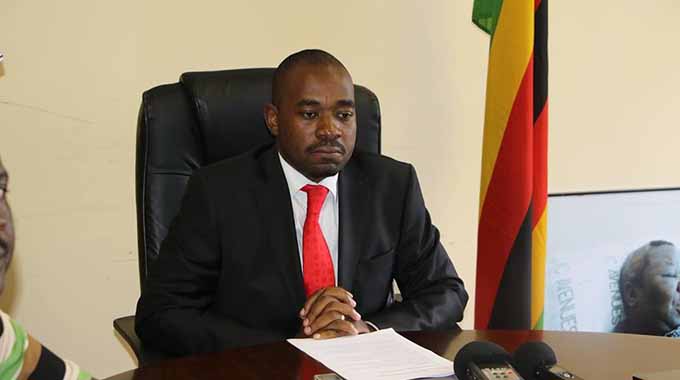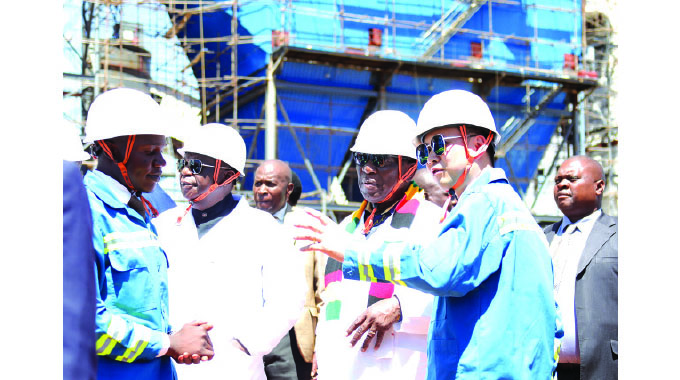Chamisa, cobra politics

Reason Wafawarova Correspondent
FROM the time Nelson Chamisa entered mainstream politics as the youth chairman for the then newly formed MDC in 1999, his ambitions were quite evident. At the time all he was armed with was political activism and student radicalism, nothing more.
There were better shining stars like the late Learnmore Judah Jongwe, a whole load of intellectuals, trade unionists and seasoned activists like Munyaradzi Gwisai and others, and Chamisa was just an impressive kid. Coming from Harare Polytechnic with an incomplete Diploma in Marketing, Chamisa was seen as intellectually irrelevant.
He realised that academic credentials were going to be an impediment and he quickly enrolled for a marketing degree with UNISA, further enrolling for another degree in Political Science with the University of Zimbabwe, after which he did a Masters in International Relations and a law degree.
Meanwhile, he personalised the MDC youth wing and started side-lining all perceived threats among the young people who were from either the University of Zimbabwe or NUST. He surrounded himself with school dropouts and half literates from Harare’s high-density suburbs, particularly from Highfield and the surrounding areas. He wanted to be the shining light among an ocean of dunderheads.
Those who worked with Chamisa at Harvest House know very well what kind of a leader he was at the youth wing. He surrounded himself with thugs he called “Vakomana veJambanja” the likes of the late Tonderai Ndira and others. This was the origin of today’s Vanguards, at one time called the DRCs.
The untimely death of Learnmore Jongwe opened two opportunities for Chamisa. After failing to impress Tsvangirai and others in the MDC leadership that he was MP material in Election 2000, Jongwe’s death provided him with the opportunity to contest for Parliament in 2003.
Secondly, the death of Jongwe provided Chamisa the chance to become the MDC’s national spokesperson, a post left vacant by the late vibrant politician, Judah Jongwe.
In Chamisa’s own words he had come from being the “wheels” of the party to becoming the “hooter”. So at the 2006 congress he was chosen party spokesperson with little challenge after many senior members had left the party during the 2005 split.
These included people like Gibson Sibanda, Welshman Ncube, Paul Temba Nyathi, Gift Chimanikire and others.
When campaigning for the national organising secretary position in 2011, Chamisa said he now wanted to become the engine of the MDC-T, and added he would one day become the driver of the entire MDC vehicle. He then dislodged Elias Mudzuri, and he became the party’s commissar thereafter.
He did a terrible job of it all, handing the MDC its worst ever defeat in Election 2013. The party was in shambles as Nelson Chamisa left a trail of disenfranchised members across the country. His main problem was empire building and imposition of loyalists in place of meritorious and hardworking leaders.
When Election 2013 came, Chamisa and Tsvangirai were the main culprits in candidate imposition. Chamisa used what he called party consensus where he personally consented on behalf of all others in the party, punishing and isolating all people who dissented and opposed him. He even declared God had told him certain things, and no one had the right to question him.
Then came the Tendai Biti-Elton Mangoma Biti split, alongside others like Lovemore Moyo, Sipepa Nkomo and others. Again Chamisa played his usual cobra politics and dined with the dissenters during the night while standing by Tsvangirai during the day. He urged all others to leave the “scandalous” Tsvangirai, but he himself did not leave.
He had done the same thing in 2005 when those he cheered on left, yet he remained.
By machinations that reportedly involved Morgan Tsvangirai’s wife Elizabeth, it so happened that Morgan Tsvangirai just woke up one fine morning and appointed Elias Mudzuri and Nelson Chamisa his deputies, alongside the then elected deputy president Thokozani Khupe.
This was after Douglas Mwonzora had humiliated Chamisa in the contest for the secretary-general’s post on November 3, 2014. Morgan Tsvangirai had a hand in the defeat of Chamisa.
The appointment of Chamisa as one of the deputies in 2017 did not go down well with a number of people, including his conqueror for the SG post, Douglas Mwonzora, as well as the elected deputy, Khupe.
But Chamisa is a cobra politician, and this was the time to strike. He knew Morgan Tsvangirai was dying of cancer, and the snake side of Chamisa started to show brazenly in January 2018. He knew he was turning 40 in a month, and he knew an election was coming where Mnangagwa would be the opponent. No Khupe or Mudzuri was going to stand in his way.
He retraced his loyalists in the MDC youth wing, and he started to use them to silence every dissenting voice by sheer force and coercion.
So the Morgan Tsvangirai deathbed dramas started to unfold, with family members dragged in to try and stop Chamisa from robbing a dying man of his position even before he breathed his last.
No amount of anger from Tsvangirai’s family could stop the Cobra. He declared himself in charge when both Khupe and Mudzuri were bidding farewell to Tsvangirai on his deathbed. Just hours after Tsvangirai breathed his last, Nelson Chamisa unilaterally held a national executive meeting and declared himself the successor of Tsvangirai.
He hijacked protocols and funeral procedures at the burial of Tsvangirai and found his way to address the mourners, much against the will of the Tsvangirai family and the organisers.
Chamisa’s thugs from the Vanguard manhandled Douglas Mwonzora and Thokozani Khupe at the funeral, and they were nearly torched to death in a hut where they had taken refugee.
Mwonzora decided against leaving the main MDC, but Khupe could have none of Chamisa’s hawkish politics. She left with a load of other disgruntled members and they claimed they were the legitimate MDC-T, even winning a court battle to the same effect.
Nelson Chamisa proceeded to lead what he called the MDC-Alliance, under which he contested the 2018 election. The whole campaign programme was about himself and himself alone. There was no party involvement in campaigns for Members of Parliament, and all resources were channelled to campaign for Chamisa’s presidency.
He did rallies all by himself for three months while Zanu-PF was backing its structures in campaigning for its parliamentary candidates. With only a month to go, Zanu-PF started its presidential race campaign.
Chamisa had already gone far and wide claiming God was in his campaign, apart from a whole lot of other super hilarious utterances.
Not surprisingly, the MDC-Alliance was trounced badly in the parliamentary race, getting only 64 seats out of 210. Chamisa also lost the presidential race, albeit by a much narrower margin than did his makeshift political outfit christened the MDC-Alliance.
The Cobra could not be consoled, cannot be consoled to date, and has since embarked on a self-destruct mode. He threatened to install himself President, has threatened to make the country ungovernable and goes around the country mobilising people to “march to State House”.
Chamisa wants everything in Zimbabwe to crumble and dismantle until he becomes President. He wants the country isolated, he wants the rains to stop coming, calamities to befall the country, sanctions to ravage the economy, the dead to multiply on hospital deathbeds, livestock to just drop dead, goods to disappear from supermarkets, and cash to just disappear. He wants the country to burn to ashes until he is installed the supreme leader.
Chamisa now believes only he has the keys to the future of Zimbabwe, and that only he can make the country work.
The Cobra is now stranded. He has to contend with Douglas Mwonzora and Elias Mudzuri to keep his robbed leadership post alive. A lot of senior politicians in the MDC-Alliance believe Chamisa is now a liability, but they are scared of the Cobra’s venomous Vanguard. Chamisa badly wants a deal with Mnangagwa so he can legitimise himself ahead of the planned MDC-Alliance congress. It does not appear like ED Mnangagwa is in any hurry to discuss anything with Chamisa, and the Cobra is clearly getting frustrated.
Meanwhile, in typical cobra style, Chamisa just woke up one day appointing people to various national executive posts, in the process relegating Tendai Biti to deputise the eccentric Thabitha Khumalo, whom Chamisa made national chair.
Of course, the idea was to place Biti in a place where he cannot be the threat he is, given his self-declared proximity to Western powers. Chamisa does not want the Mudzuris, the Mwonzoras or the Bitis of this world around him. He prefers the Khumalos, the Komichis and other weaker characters with no known intellectual prowess or political clout. These are the people the Cobra wants around himself.
Surprisingly, Chamisa’s role model is Robert Mugabe, and he confides and says he copies his political style from the disgraced hero of Zimbabwean politics. Indeed, Robert Mugabe always wanted to be the only shining star in an ocean of darkness. Everyone must be darkness, and the only light was Mugabe the Great.
Chamisa does the same thing. He isolates shining lights and draws to himself characters of darkness. The other thing about Nelson Chamisa is that everyone is expendable to him. This is why he disowned his own supporters who protested on his behalf on August 1. Just to try and impress the Commission of Inquiry on the violence that happened on that day, Chamisa disowned the MDC protesters and called them “stupid”.
Those who have worked with Chamisa were not surprised. In fact, the word “stupid” was being directed at Biti who was central to the planning and executing of that fateful protest. Chamisa longs for a Biti conviction on the violence matter, and he would not care any less. It is unthinkable that a character as insincere as Chamisa is allowed by our electorate to be runner-up in a presidential race.
I believe by 2023, the Cobra will have done great harm to his own name to self-destruct, but we have to wait and see.
Zimbabwe we are one and together we will overcome. It is homeland or death!
Reason Wafawarova is a political writer based in Sydney, Australia






Comments